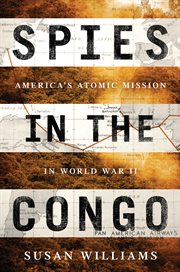Nonfiction
eBook
Details
PUBLISHED
Made available through hoopla
DESCRIPTION
1 online resource
ISBN/ISSN
LANGUAGE
NOTES
In the 1940s, the brightest minds of the United States and Nazi Germany raced to West Africa with a single mission: to secure the essential ingredient of the atomic bomb -- and to make sure nobody saw them doing it Albert Einstein told President Franklin D. Roosevelt in 1939 that the world's only supply of uniquely high-quality uranium ore -- the key ingredient for bomb -- could be found in the Katanga province of the Belgian Congo at the Shinkolobwe Mine. Once the US Manhattan Project was committed to developing atomic weapons for the war against Germany and Japan, the rush to procure this uranium became a top priority -- one deemed "vital to the welfare of the United States." But covertly exporting it from Africa posed a major risk: the ore had to travel via a spy-infested Angolan port or 1,500 miles by rail through the Congo, and then be shipped by boats or Pan Am Clippers to safety in the United States. It could be poached or smuggled at any point on the orders of Nazi Germany. To combat that threat, the US Office of Strategic Services sent in a team of intrepid spies, led by Wilbur Owings "Dock" Hogue, to be America's eyes and ears and to protect its most precious and destructive cargo. Packed with newly discovered details from American and British archives, this is the gripping, true story of the unsung heroism of a handful of good men -- and one woman -- in colonial Africa who risked their lives in the fight against fascism and helped deny Hitler his atomic bomb. Dr. Susan Williams is a senior research fellow at the Institute of Commonwealth Studies, University of London. Williams's research is archive based; her research has taken her to many countries in Africa, Europe and North America. Susan served as historical adviser to the independent Hammarskjold Commission, which was founded in direct response to Wiliams previous book, "Who Killed Hammarskjold" and released its report at the Peace Palace in The Hague in September 2013. She has published widely on Africa, decolonization, and the global power shifts of the twentieth century, receiving widespread acclaim for Colour Bar (Penguin), her book on the founding president of Botswana. Other recent books include The People's King (Penguin) and Ladies of Influence (Penguin), as well as edited volumes including The Iconography of Independence: Freedoms at Midnight. Susan Williams lives in London
Mode of access: World Wide Web







